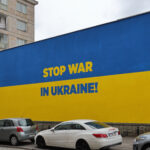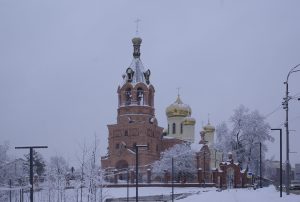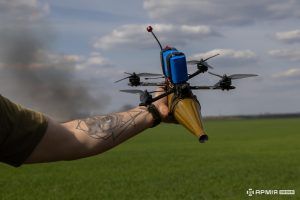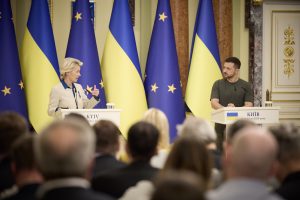
I was born and raised in the Greater Toronto Area and had the privilege of living a safe, worry-free, and opportunity-laden childhood. I am grateful for my fortune growing up due to the stories I was told of my great-grandparents and their family escaping Lithuania at the end of the Second World War and immigrating to Canada in search of a better life. The struggle of Lithuanians during the Soviet occupation was also well documented to me during family discussions and Lithuanian Saturday school classes. Deportations to hard labour camps in the remote corners of Siberia were unfortunately all too common, and those lucky enough to avoid that fate were still left to live under oppressive Soviet policies.
It was September 2020 and I had just begun my first-year studies at the Faculty of Applied Science and Engineering at the University of Toronto and the possibility of a prolonged lockdown was weighing heavily on my mind. Therefore, I was contemplating what I could do to avoid spending two years of my university education within the confines of my bedroom. That is when I began considering the prospect of enlisting in the Lithuanian Military for its nine-month basic training program. I am fortunate enough to have dual citizenship (Lithuanian and Canadian) which also meant that there was the possibility of being drafted into this program. Upon voicing my interest in this opportunity, I am deeply grateful to my parents for being so incredibly supportive and doing everything possible to help me achieve my goal. An acquaintance of my parents suggested I begin by checking if I had been drafted that year, as lists of draftees are released every January. Lo and behold, my name was on that list, and although I was never formally contacted, I was fined 30 euros for not responding to my summons promptly! Fortunately, I was able to waive my draft since I was currently a student, and the following January I volunteered for the basic training program instead of waiting to be drafted which offered several benefits to volunteers.
Before beginning my service, in the midst of my winter semester, I had to complete a comprehensive medical exam, for which I had to travel to Lithuania in March 2021. Fortunately, I passed all the required examinations and returned home to Canada to complete my first-year of studies and enjoy the summer before flying back to Lithuania to begin my service in October. The battalion I chose to serve in is named Vaidoto Mechanized Infantry Battalion and my selection was mainly driven by the fact that I wanted the most ordinary troop training. In addition, this battalion operated out of Rukla, Lithuania which is where many of the NATO troops in Lithuania are stationed. The name of my battalion is rather misleading though, as we never stepped foot into an infantry vehicle or tank, instead, we were expected to move on foot at all times.
I flew to Lithuania a couple of weeks prior to the day I was to report for duty, so I could acclimatize, meet with my parent’s friends, and relatives, as well as move into my aunt’s spare apartment in the capital of Lithuania, Vilnius. It was clear to me at that point I would need to make my own friends and acquaintances in Lithuania. By some twist of fate, I ended up meeting one of my best friends from my time in the military, Deivydas, within seconds of stepping out of the car that dropped me off in front of the conscription building. I was thrilled to have a companion to speak with while a bus drove us from Vilnius to our battalion’s base. While waiting in what seemed to be hours of lineups during the first day on base, I met my other best friend from the military, Andrius, and the two of us ended up in the same squad, sharing a bunk bed.

The remainder of my squad (in total there were 11 of us) was composed of a mosaic of ethnicities, which is why we became known as the international squad. We were: three Lithuanians, two Poles, two Ukrainians, a Belarussian, a Russian, a Dominican, and myself. This made for very fascinating evenings as any of the five different languages could be heard at different times, when we called home to our families. The Dominican, Marcos, was born and raised in Spain, which made the two of us the only foreigners in our company (90 conscripts), and by some odds, we ended up sharing a room. Whereas the natives of Lithuania only had to adjust to the new routine and setting, Marcos and I were adjusting to a different culture and language as well. It certainly helped that I had attended Lithuanian Saturday School throughout my childhood and that I spoke Lithuanian at home with my parents, but there were still many colloquial terms that I had to learn.
The first 3 months of service are coined as our “basic courses”, and are standardized across all the branches and battalions of the Lithuanian military. We are introduced to the fundamental skills and abilities expected of a soldier, such as marching, orienteering, handling and firing an automatic weapon, etc., and these are taught in a classroom setting first and then applied practically. At the end of our first month, there is a ceremony where we repeat an oath, swearing to give the ultimate sacrifice to protect Lithuania if need be — this was an extremely profound moment as 450 of us repeated the oath at once as the families of the conscripts looked on. We also received the lowest rank in the military, the Lithuanian equivalent of a Private, during this ceremony.
We were released just before Christmas, and I flew to Hamburg, Germany to celebrate the holidays with my uncle’s family. We had to return to base before New Year’s Eve, so we celebrated the arrival of 2022 by drinking fake champagne and watching the NATO soldiers’ fireworks show. I sorely missed my family during this period and would call them whenever there was an opportunity. They would often patiently listen to all of my grievances and frustrations. I am glad I was even able to speak with them on a semi-regular basis, as I was reminded by my uncle that while he served in the Soviet Army he could only write letters to family back home, and would wait impatiently for a response to arrive in the mail months later. Keeping things in perspective in such a manner was an effective exercise for my mental health while I served, and I believe this ability will benefit me in the future, whenever life becomes a little overwhelming.
Following the holidays, we began our “specialized training” where each member of our squad was assigned a specific role. I was appointed the machine gunner of my squad, which entailed a change of primary weapon. I would now carry a 25 lb 20th century light machine gun, instead of an automatic rifle. I was ecstatic to have Andrius assigned as my assistant, which meant we would be training together, and we would be by each other’s side during exercises and drills.
Avoiding the restrictions imposed by the Covid-19 pandemic in Canada was a major motivator for my decision to enter the Lithuanian Military, however, I still felt its impact during my service. Mask-wearing was made mandatory on an intermittent basis, typically whenever there were positive cases detected in the battalion. Just as back home in Canada, a portion of our officers were stringent enforcers of this mandate, while others would not give a second thought to it. Naturally, our company had a few outbreaks of the virus throughout our nine months, and in those instances, the affected squads were quarantined in their rooms for two weeks. Although many were thrilled to lounge in their rooms for days on end, eventually watching Netflix and sleeping all day became monotonous. Fortunately, my squad was able to avoid this fate. The most challenging consequence of the pandemic was that we were released far less frequently on the weekends than would be common. Admittedly this had much less of an effect on me in comparison to those who lived in Lithuania, as they were missing out on opportunities to see their families.
The most significant event that occurred during my service did not even happen in Lithuania, rather, it was 800 km southeast of my location. I am of course speaking of the events of February 24th, 2022 — a day that I will remember in infamy — when the Russian Federation invaded Ukraine. Even with all of the warnings and threats in the run-up to the invasion, it still came as a shock to everybody when the news broke. The general opinion was that it was unfathomable for a war to begin on the continent of Europe in the 21st century. I cannot quite remember my exact emotions at the time, but I know I was not scared — perhaps I had not quite fully absorbed the event’s consequences or I believed that Lithuania was untouchable because of its NATO membership. Whether or not he could guarantee it, our company’s commander reassured all of us conscripts that we were safe and would not be dragged into any conflict as long as Lithuania’s borders were not breached.
There were no systemic changes made in our service in the aftermath of the invasion, however there was a tangible increase in the focus and effort of the conscripts, that the threat of a Russian invasion was highly possible, and we best be prepared for it. We were released the weekend following Ukraine’s invasion and I was amazed to witness the extent to which the Lithuanian public in the capital Vilnius, was responding in support of Ukraine.
On April 1st the entire battalion (450 conscripts) was scheduled to attempt the “Wolf’s trail” (Vilko Takas), a seven-kilometre mud run which upon completion would earn us our berets. Although the run was done on April Fools’ Day, this activity was no laughing matter. The challenge included several team exercises; pushing an army truck, an ammo box bucket brigade, situps, and squats with a log, and an extensive obstacle course. I would be lying to myself if I said this was not one of the most difficult physical challenges I have had to overcome in my life and I am proud of how well I handled it, and I am thrilled with the support I provided to my squadmates to ensure that they also succeeded. Our platoon was praised for having every single individual complete the challenge, which according to our officers is not a common accomplishment. That evening a ceremony was held during which we earned the right to wear our berets.

Eventually, the final night was upon us and there were whispers that the officers had planned some sort of midnight trek through the muddy obstacle course we’d previously completed. As with any night, our bedtime was 9:45 pm, and almost everyone lay wide awake in nervous anticipation. Sometime around midnight, the fire alarm went off, and all of our officers began running through the halls screaming and yelling into bullhorns! We were told to immediately get dressed and to get into formation outside. Just as we had been warned, a night of running through bogs and mud trails ensued, all the while carrying ammo boxes full of water. Any time our officers yelled “ARTILLERY!” we were expected to drop flat on our stomachs — even in a knee-deep bog! It is safe to say we all returned covered in mud, yet almost everyone had a wide grin on their faces in the aftermath of the night. The following morning we participated in a ceremony terminating our nine-month service and were subsequently released, free as birds to do whatever we like.
I stayed in Lithuania for two weeks after concluding my service, visiting friends, family, going out in the capital, and spending a weekend along the Baltic sea with my squadmates. I was elated to return home, knowing that my family was waiting at the airport for my arrival. It was an emotional reunion and I was overjoyed to share an embrace with both my parents, and my younger brother. I had of course missed my mother’s cooking and was treated to one of my favourite meals during our first shared supper in more than nine months.
Readjusting to life at home and in Canada was not an easy process and it took me a couple of weeks before I had smoothed the rough edges I had developed during my training. Still, it was wonderful to be in the company of my family and friends again. I even had the opportunity to introduce Canada to one of my best friend’s from my squad, Andrius, when he visited for three weeks in the summer. One observation we both made while here in Canada was the lack of visible support for Ukraine (at least relative to Lithuania), particularly among our generation. Of course, Canada’s distance from the conflict plays a part in this, but there is a general lack of gratitude for the safety and peace of mind afforded to all Canadians. We fail to appreciate the sacrifices made by those who have served in the past, particularly those who paid the ultimate sacrifice in the defense of our values. This acknowledgement and the challenges I faced during my service have already helped me maintain perspective and persevere during my second-year of studies at the University of Toronto. I have no doubt that my experience in the Lithuanian Military had a significant, positive impact on my life, and that I have not even reaped all of its benefits.





